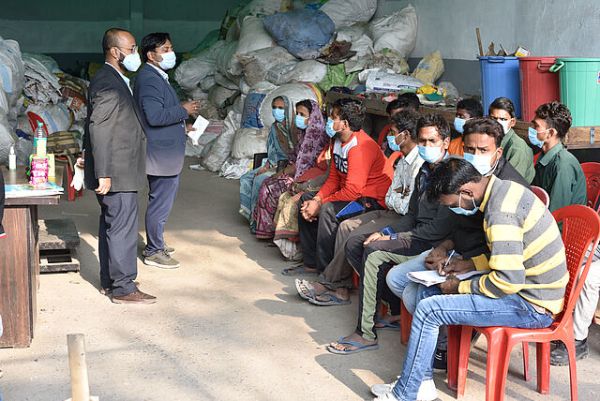Promoting the formalisation of informal waste workers in Varanasi, India

Disclaimer: This news piece was authored* by the NAMA Support Project (NSP) “India – Waste Solutions for a Circular Economy”.
As is the case in other parts of urban India, informal waste workers in the north Indian city of Varanasi (in the state of Uttar Pradesh) support efficient management of Municipal Solid Waste (MSW) by supporting recovery of dry recyclable fractions. Improving the working conditions and income of informal waste workers through formalisation can help in improving MSW management in cities by increasing efficiency of collection, sorting and processing of solid waste. Further, formalisation will also lead to more skilled people joining the waste management sector. Source segregation of MSW by waste generators can also help in improving the income of informal waste workers due to the increased quantity in recyclables sorted by them.
To complement the above-mentioned goal, Deutsche Gesellschaft für Internationale Zusammenarbeit (GIZ) GmbH supports source segregation awareness activities and recently conducted a capacity development training for the informal waste workers of Varanasi. The activities were part of the NAMA Facility project “Waste Solutions for a Circular Economy”, also referred to as “Circular Waste Solutions”. The training witnessed the participation of 44 informal waste workers, including 19 women. From this training, a knowledge gap was discovered, specifically, that informal waste sector workers are unaware of recyclable material types like beverage cartons and Multi-Layered Packaging (MLP), which, if left uncollected, create a gap in promoting a circular economy and contribute to increasing greenhouse gas (GHG) emissions when waste is incinerated or sent to the landfill. Currently, collection of MLP and beverage cartons remains limited because these are mostly found in a soiled state and require substantial effort in collection and recycling. The low buyback price, along with the limited number of MLP and beverage carton recycling facilities, results in the low interest of the waste collectors. The situation can get better if more and more waste generators start source segregation and MLP and beverage carton recycling is incentivised.
Furthermore, it was also observed that participants had limited awareness about the social security schemes of the Government of India and the state government available for citizens of India. This is mostly because of the limited sources of information and formal education among the informal waste workers. On the health and safety front, participants were found to be familiar with protection measures such as masks, gloves and glow-in-the-dark jackets. However, they mentioned hardly using them, due to irregular access to such protection measures.
One lesson that stood out was the interest among participants to be informed about social security schemes and the process of accessing them. Most of the challenges faced by the informal waste workers of Varanasi and across India can be solved by making them a part of the formal waste management sector. As India works towards the low-carbon transformation of its waste sector, formalising the informal waste sector will play a significant role. Many organisations as well as the Urban Local Bodies (ULBs) are already taking a lead on this by setting up infrastructure, including Material Recovery Facilities (MRFs) for dry waste segregation. Once formalised, waste pickers can be engaged in different roles in facilities which are expected to multiply in the coming days.
Additionally, as part of their formalisation, linking workers with social security schemes like Ayushman Bharat Pradhan Mantri Jan Arogya Yojana will help the workers and their families access multiple benefits, such as health insurance. Further, formalisation will also lead to improvement of their financial status, as workers could then open bank accounts and better manage their finances.
Formalised workers would also be able to form self-help groups and thereby receive micro-loans to set up businesses and partake in entrepreneurial opportunities.
Formalisation of waste workers provides a key opportunity for efficient climate change mitigation and social development in India, especially in areas of education and vocational training.
Considering that solid waste generation will only grow with time in India, there is a scope to create a formal workforce that will contribute to a circular economy. Linking informal waste workers with the formal sector will lead to the establishment of a sustainable waste management system in India and promotion of circular economy.
*Authors
Rittyz Kashyap, Communication Advisor, Waste Solutions for a Circular Economy, GIZ India.
Siddhant Malhotra, Junior Technical Advisor, Waste Solutions for a Circular Economy, GIZ India.
Jai Kumar Gaurav, Senior Technical Advisor, Climate Change and Circular Economy, GIZ India.
The NAMA Facility is a joint initiative of the German Federal Ministry for Economic Affairs and Climate Action (BMWK), UK’s Department for Business, Energy and Industrial Strategy (BEIS), the Danish Ministry of Climate, Energy and Utilities (KEFM), the Danish Ministry of Foreign Affairs (MFA), the European Union and the Children’s Investment Fund Foundation (CIFF).
